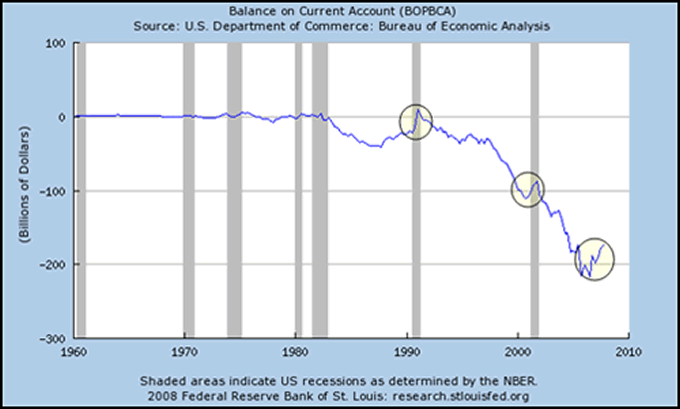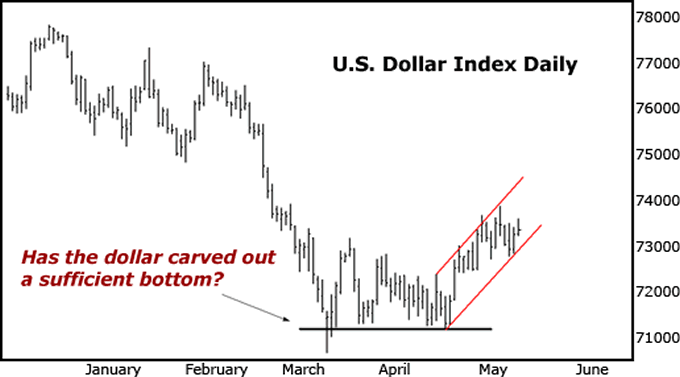How the Recession Will Impact the US Dollar
Currencies / US Dollar May 18, 2008 - 11:04 AM GMT Jack Crooks writes: Too severe, or not too severe; that is the question. I'm talking about the U.S. recession that we're already in, about to be in, or hoping to avoid.
Jack Crooks writes: Too severe, or not too severe; that is the question. I'm talking about the U.S. recession that we're already in, about to be in, or hoping to avoid.
At this point it depends a lot on how you approach the subject, but assuming for a moment that recession is inevitable, analysts and economists are asking: How much will growth contract? Can Mr. U.S. consumer muddle through, or will he stumble and fall? And how much have financial markets already discounted an official recession?
Today, I'll answer these questions and tell you what to expect in the currency markets, namely the U.S. dollar. First, let's address ...
HOW to Identify a Recession
Unfortunately, pinpointing the magnitude and velocity of a recession before it has ended isn't as easy as measuring the change in housing starts last quarter, sending out billions of dollars in tax rebate checks, or licking the pointy part of your elbow.
Recession identification requires the gift of hindsight. You only know it by looking in the rear view mirror. In other words, it includes the stuff markets have already started to, or completely, priced into the mix.
As the U.S. economy presses on — battling through a fragmented real estate market, a sticky lending environment, soaring food and energy prices and substantial job losses — we seek answers that may forecast the end of this mess. We want to know if our economy will be knocked on its back and when it will climb back on its feet.
Trusty economists are always tossing their predictions out. There are those who believe the recession will be rather shallow, but could last for a couple quarters. Richard Fisher, Dallas Federal Reserve President, mirrored those thoughts in commentary he made just yesterday. He cited the excesses due to credit market mayhem as the reason for a long and drawn out recessionary period.
But rather than listen to economists, here's a predictor that has done a good job of forecasting the last two recessions — and may be doing it again; it's the U.S. Current Account Deficit. Please see the following chart ...

Why is this benchmark a good predictor of recessions? It points to two things ...
1.) U.S. consumers (still the big dogs in the global consumption race) are pulling in their horns and buying less and saving more.
2.) It also means that dollar liquidity is falling from around the globe — that's bad for business everywhere and adds to the recession potential.
Oh, and by the way, the last two improvements in the U.S. current account circled above, in the late 1990s and early 2000s, coincided quite nicely with major stock market crashes!
Of course, opinions vary as to the question of just how hard this recession will hit. I tend to think ...
Despite What the Number Crunchers In Washington Say About Official Figures, U.S. Consumers Will Get Pummeled
The way I see it, the recession is just in its beginning stages. And the growth picture will get pretty nasty before it's all said and done. Some of the latest predictions expect unemployment to rise considerably — averaging roughly 5.6% over the next two years. Sure, this unemployment figure may not be all that horrendous on a historical basis, but U.S. consumers sure aren't going to have it easy fending off recession if they can't secure a steady income.
The way I see it, there are enough economic doctors (read: central bankers and government officials) dishing out loans and fiscal stimulus checks to keep things from spiraling out of control. But the foundation is too broken up from the credit mayhem to expect a speedy recovery.
And even if the numbers don't turn too far south and the economy undergoes only a "mild" recession, there's a chance it could actually still "feel" a lot worse than that.
I dug up some stats from the 2006 Bureau of Labor Statistics Consumer Expenditure Survey that I thought might help explain this point. So think about this:
- Households earning less than $70,000 per year made up nearly 70% of all U.S. households included in the survey.
- Expenditures among those households earning less than $70,000 per year amounted to $2.77 billion — or less than half of total household expenditures.
- Naturally, spending on food, gasoline and housing made up 54.7% of total expenditures among households earning less than $70,000 per year versus an average of only 48% of total expenditures among households making more than $70,000 per year.
In other words, a smaller group of wealthy people account for a disproportionately large piece of total consumption. Additionally, the larger group of less-wealthy people put up a larger percentage of their total expenditures towards necessities like eating, driving and dwelling.
What's that mean? Two things:
First, since food and energy prices are on the rise, the majority of the population is bound to feel worse when their discretionary income goes in one end and out the other faster than before.
Second, households earning more than $70,000 per year, less affected during periods of slowdown, will still have sufficient discretionary income to keep the economy above water.
Those on the lower level of the earnings totem pole will be battling throughout the ongoing slowdown. And they might get some sympathy. But the number crunchers in the marketplace will be salivating when "official" figures reveal only a mild recession at worst.
So what's it all mean for the U.S. dollar? Well, just remember ...
The Markets Are ALWAYS Early!
Markets tell us what we can expect; or at least what other traders and investors expect. So keep an eye on the U.S. dollar. As the chart below clearly demonstrates, the greenback is on the move.

The dollar has stabilized since hitting an all-time low on March 17. And it's even eked out a notable rally. A shift in expectations for the U.S. economy — even from bad to less-bad — might offer some support for the low-lying buck.
And it's worth noting that the buck has rallied during the last four of five U.S. recessions! Do I hear six?
Best wishes,
Jack
This investment news is brought to you by Money and Markets . Money and Markets is a free daily investment newsletter from Martin D. Weiss and Weiss Research analysts offering the latest investing news and financial insights for the stock market, including tips and advice on investing in gold, energy and oil. Dr. Weiss is a leader in the fields of investing, interest rates, financial safety and economic forecasting. To view archives or subscribe, visit http://www.moneyandmarkets.com .
Money and Markets Archive |
© 2005-2022 http://www.MarketOracle.co.uk - The Market Oracle is a FREE Daily Financial Markets Analysis & Forecasting online publication.



